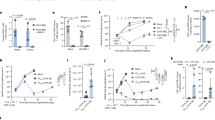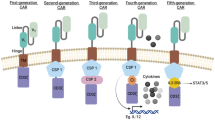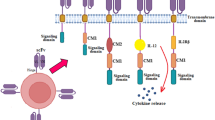Summary
Cellular adoptive therapy (CAT) of cancer has begun to evolve as a new modality of treatment for metastatic disease. The initial enthusiasm for CAT has now abated in view of the evidence that only about one-third of patients with metastatic melanoma or renal cell carcinoma treated with CAT have achieved objective responses. Nevertheless, studies from animal models of tumour metastasis, and more recent clinical trials in which selected populations of activated lymphocytes instead of lymphokine-activated killer (LAK) cells are being used for therapy, indicate that CAT may be very effective in eliminating established metastases and inducing long term responses in patients unresponsive to conventional therapies.
The mechanisms responsible for the antitumour effects of adoptively transferred subpopulations of effector cells are not understood and are under intense investigation at this time. Future prospects for improvements in efficacy of CAT include: (a) transfer of genetically modified effector cells; (b) use of cells armed with tumour antigen—specific monoclonal antibodies; and (c) combination therapy with CAT and adjuvant use of chemotherapeutic agents.
Similar content being viewed by others
References
Shu S, Rosenberg SA. Adoptive immunotherapy of a newly-induced sarcomas: immunologic characteristics of effector cells. J Immunol 1985; 135: 2895–903
Mulé JJ, Ettinghausen SE, Spiess PJ, et al. Antitumor efficacy of lymphokine-activated killer cells and recombinant interleukin 2 in vivo: survival benefit and mechanisms of tumor escape in mice undergoing immunotherapy. Cancer Res 1986; 46: 676–83
Rosenberg SA, Lotze MT, Muul LM, et al. Observations of the systemic administration of autologous lymphokine-activated killer cells and recombinant interleukin 2 to patients with metastatic cancer. N Engl J Med 1985; 313: 1485–92
Rosenberg SA, Lotze MT, Muul LM, et al. A progress report on the treatment of 157 patients with advanced cancer using lymphokine activated killer cells and interleukin 2 or high-dose interleukin 2 alone. N Engl J Med 1987; 316: 889–97
Whiteside TL, Jost LM, Herberman RB. Tumor-infiltrating lymphocytes: potential and limitations to their use for cancer therapy. Crit Rev Oncol Hematol 1992; 12: 25–47
Whiteside TL, Herberman RB. Human natural killer cells in health and disease: biology and therapeutic potential. Clin Immunother 1994; 1: 56–66
Ortaldo JR, Mason A, Overton R. Lymphokine-activated killer cells: analysis of progenitors and effectors. J Exp Med 1986; 164: 1193–205
Rosenberg SA. Adoptive immunotherapy of cancer using lymphokine activated killer cells and recombinant interleukin-2. In: DeVita Jr VT et al., editors. Important advances in oncology 1986. Philadelphia: JB Lippincott Co., 1986: 55–91
Vujanovic NL, Herberman RB, Maghazachi AA, et al. Lymphokine-activated killer cells in rats. III. A simple method for the purification of large granular lymphocytes and their rapid expansion and conversion into lymphokine-activated killer cells. J Exp Med 1988; 167: 15–29
Schwarz RE, Vujanovic NL, Hiserodt JC. Enhanced antimetastatic activity of lymphokine-activated killer cells purified and expanded by their adherence to plastic. Cancer Res 1989; 49: 1441–6
Yasumura S, Lin W-c, Hirabayashi H, et al. Immunotherapy of liver metastases of human gastric carcinoma with IL2-activated natural killer cells. Cancer Res 1994. In press
Dutcher JP, Creekmore S, Weiss GR, et al. A phase II study of interleukin-2 and lymphokine-activated killer cells in patients with metastatic malignant melanoma. J Clin Oncol 1989; 7: 477–85
Gambacorti-Passerini C, Hank JA, Albertini MR, et al. A pilot phase II trial of continuous infusion interleukin-2 followed by lymphokine-activated killer cell therapy and bolus-infusion interleukin-2 in renal cancer. J Immunother 1993; 13: 43–8
Hawkins MJ, Atkins MB, Dutcher JP, et al. A phase II clinical trial of interleukin-2 and lymphokine-activated killer cells in advanced colorectal carcinoma. J Immunother 1994; 15: 74–8
Rosenberg SA, Lotze MT, Yang JC, et al. Prospective randomized trial of high-dose interleukin 2 alone or in conjunction with lymphokine-activated killer cells for the treatment of patients with advanced cancer. J Natl Cancer Inst 1993; 85: 622–32
Curti BD, Longo DL, Ochoa AC, et al. Treatment of cancer patients with ex vivo anti-CD3-activated killer cells and interleukin 2. J Clin Oncol 1993; 11: 652–60
Chang AE, Yoshizawa H, Sakai K, et al. Clinical observations on adoptive immunotherapy with vaccine-primed T-lymphocytes secondarily sensitised to tumour in vitro. Cancer Res 1993; 53: 1043–50
Mazumder A, Eberlein TJ, Grimm EA, et al. Phase I study of the adoptive immunotherapy of human cancer with lectin-activated autologous mononuclear cells. Cancer 1984; 53, 896–905
Gold JE, Malamud SC, La Rosa F, et al. Adoptive chemoimmunotherapy for the treatment of relapsed and refractory solid tumours using ex vivo activated memory T cells (autolymphocyte therapy) and cyclophosphamide. J Immunother 1993; 13: 213–21
Vujanovic NK, Rabinowich H, Lee YJ, et al. Distinct phenotypic and functional characteristics of human natural killer cells obtained by rapid interleukin 2-induced adherence to plastic. Cell Immunol 1993; 151: 133–57
Whiteside TL, Elder EM, Moody D, et al. Generation and characterization of ex vivo propagated autologous CD8+ cells used for adoptive immunotherapy of patients infected with human immunodeficiency virus. Blood 1993; 81: 2085–92
Whiteside TL. Tumor-infiltrating lymphocytes in human malignancies. Austin: Medical Intelligence Unit, RG Landes Co, 1993
Aebersold P, Hyatt C, Johnson S, et al. Lysis of autologous melanoma cells by tumor-infiltrating lymphocytes: association with clinical response. J Natl Cancer Inst 1991; 83: 932–7
Sosman JA, Kohler PC, Hank J, et al. Repetitive weekly cycles of recombinant human interleukin 2: responses of renal carcinoma with acceptable toxicity. J Natl Cancer Inst 1988; 80: 60–3
Parmiani G, Anichini A, Fossati G. Cellular immune response against autologous human malignant melanoma: are in vitro studies providing a framework for a more effective immunotherapy? J Natl Cancer Inst 1990; 82: 361–70
Letessier EM, Heo DS, Okarma T, et al. Enrichment in tumor-reactive CD8+ T lymphocytes by positive selection from the blood and lymph nodes of patients with head and neck cancer. Cancer Res 1991; 51: 6153–62
Ho M, Armstrong J, McMahon D, et al. A phase I study of adoptive transfer of autologous CD8+ T lymphocytes in patients with acquired immunodeficiency syndrome (AIDS)-related complex or AIDS. Blood 1993; 81: 2093–101
Torpey III D, Huang XL, Armstrong J, et al. Effects of adoptive immunotherapy with autologous CD8+ T lymphocytes on immunologic parameters: lymphocyte subsets and cytotoxic activity. Clin Immunol Immunopathol 1993; 151: 3018–29
Whiteside TL, Herberman RB. Characteristics of natural killer cells and lymphokine-activated killer cells: their role in the biology and treatment of human cancer. Immunol Allergy Clin North Am 1990; 10: 663–704
Elder EM, Kirkwood JM, Whiteside TL. Characterization of human NK cells obtained from patients with cancer and cultivated for adoptive immunotherapy. J Immunol 1993; 218A
National Cancer Institute. NCI Common Toxicity Grading Criteria. Bethesda: National Cancer Institute
Hercend T, Farace F, Baume D, et al. Immunotherapy with lymphokine-activated natural killer cells and recombinant interleukin 2: a feasibility trial in metastatic renal cell carcinoma. J Biol Response Mod 1990; 9: 546–55
Sacchi M, Snyderman CH, Heo DS, et al. Local adoptive immunotherapy of human head and neck cancer xenografts in nude mice with lymphokine-activated killer cells and interleukin 2. Cancer Res 1990; 50: 3113–8
Sacchi M, Vitolo D, Sedlmayr P, et al. Induction of tumor regression in experimental model of human head and neck cancer by human A-LAK cells and IL2. Int J Cancer 1991; 47: 784–91
Rabinowich H, Vitolo D, Altarac S, et al. The role of cytokines in the adoptive immunotherapy of an experimental model of human head and neck cancer by human IL2-activated NK cells. J Immunol 1992; 149: 340–9
Basse P, Herberman RB, Nannmark U, et al. Accumulation of adoptively-transferred adherent, lymphokine-activated killer cells in murine metastasis. J Exp Med 1991; 174: 479–88
Keilholz U, Schlag P, Tilgen W, et al. Regional administration of lymphokine-activated killer cells can be superior to intravenous application: a case report. Cancer 1992; 69: 2172–5
Basse PH, Nannmark U, Johansson BR, et al. Establishment of cell-to-cell contact by adoptively transferred adherent lymphokine-activated killer cells with metastatic murine melanoma cells. J Natl Cancer Inst 1991; 83: 944–50
Sasaki A, Melder RJ, Whiteside TL, et al. Preferential localization of human adherent lymphokine-activated killer (A-LAK) cells in tumor microcirculation: a novel mechanism for adoptive immunotherapy. J Natl Cancer Inst 1991; 83: 433–7
Rosenberg SA, Aebersold P, Cornetta K, et al. Gene transfer into humans: immunotherapy of patients with advanced melanoma using tumor-infiltrating lymphocytes modified by retroviral gene transduction. N Engl J Med 1990; 323: 570–8
Takahashi H, Nakada T, Puisieux I. Inhibition of human colon cancer growth by antibody-directed human LAK cells in SCID mice. Science 1993; 259: 1460–3
Murphy WJ, Back TC, Conlon KC, et al. Antitumor effects of interleukin-7 and adoptive immunotherapy on human colon carcinoma xenografts. J Clin Invest 1993; 92: 1918–24
Verfaillie C, Miller W, Kay N, et al. Adherent lymphokine-activated killer cells in chronic myelogenous leukemia: a benign cell population with potent cytotoxic activity. Blood 1989; 74: 793–7
Lister J, Pincus SM, Elder EM, et al. Adoptive immunotherapy during peripheral blood stem cells (PBSC) transplantation: amplification of natural killer cell function early after transplant [abstract]. J Immunol 1993; 150: 218A
Author information
Authors and Affiliations
Rights and permissions
About this article
Cite this article
Whiteside, T.L., Herberman, R.B. Adoptive Immunotherapy of Cancer. Clin Immunother 2, 13–22 (1994). https://doi.org/10.1007/BF03258518
Published:
Issue Date:
DOI: https://doi.org/10.1007/BF03258518




